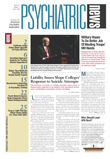The APA annual meeting displays the important role that research holds in our professional lives. This year much of the “buzz” surrounded an activity that is one of APA's most research-intensive undertakings—the launch of a massive effort to prepare the fifth edition of the Diagnostic and Statistical Manual of Mental Disorders (DSM).
The appointments of David Kupfer, M.D., chair of the APA Council on Research, and Darrel Regier, M.D., M.P.H., director of the American Psychiatric Institute for Research and Education (APIRE), as chair and vice chair, respectively, of the DSM-V Task Force, closely link the psychiatric and academic research communities in this effort. It is important for psychiatrists to appreciate the solid scientific foundation of the classification system. It is equally important to take every opportunity to teach policymakers, patients, and others that the DSM not only derives from research but also advances the scientific study of mental disorders.
As the revision moves forward, DSM-V work groups will be able to draw on a series of reviews of the scientific literature in key areas of nosology. These reviews will be among the outcomes of a five-year international cooperative research conference grant administered by APIRE, with the collaboration of the World Health Organization and the National Institutes of Health (NIH), which awarded APIRE a $1.2 million grant for the project.
Participants in 12 planning conferences are considering how emerging scientific findings might influence the shape of DSM-V and are recommending longer-term research priorities that will enhance future psychiatric classification systems in the United States and abroad. Proceedings are being published by American Psychiatric Publishing Inc.
Another annual meeting highlight this year was a special research track, which we are privileged to sponsor annually on a rotating basis with our colleagues at the National Institute on Alcohol Abuse and Alcoholism (NIAAA), National Institute of Mental Health, and National Institute on Drug Abuse. In addition, each year we hold a mini-track under the Substance Abuse and Mental Health Services Administration's sponsorship, to focus on an array of service-delivery issues. This year the NIAAA track featured alcohol-related disorders, including their comorbidity with other psychiatric and general medical illnesses.
The quality and breadth of the research that the institutes highlight in these tracks reflect one payoff of APA's investment in the Academic Consortium (Psychiatric News, April 21). Planned and coordinated by our Division of Research and Department of Government Relations, the Academic Consortium is an annual Capitol Hill event at which psychiatrists, often accompanied by patient/consumer advocates, make contact with key senators and representatives who can help sustain the research budgets of the federal institutes. Psychiatrists and advocates representing seven national organizations participate in the consortium, and we appreciate their involvement all the more in the current tough fiscal environment that now threatens to undermine the NIH budget.
In addition, a number of projects being conducted by APIRE and by our Practice Research Network (PRN) keep us at the leading edges at the interface of science, services, and policy. Among them:
•
Implementation of the Medicare Part D prescription drug benefit on January 1 raised concerns about the transition of an estimated 6 million to 7 million Medicare and Medicaid “dual-eligible” beneficiaries who have mental and addictive disorders, as they move from Medicaid to the new Medicare prescription drug plans. In a national study, APIRE staff researchers are monitoring dual-eligible psychiatric patients' access to medications and disruptions in continuity that may lead to adverse clinical consequences. Preliminary findings from the first three months of data collection show that nearly half of all the patients studied have had at least one problem with medication access or continuity, and more than one-quarter of those patients experienced a serious adverse clinical consequence.
•
The APIRE PRN, American Academy of Family Physicians, and American College of Physicians recently completed the pilot phase of the National Depression Management Leadership Initiative. This collaboration aims to assess the clinical utility of a simple metric—the nine-item Patient Health Questionnaire (PHQ-9)—to measure the severity of depression and test office systems and management strategies to optimize depression monitoring in routine clinical practice. A total of 16 primary care and 17 psychiatric practices concluded data-collection activities for this project in April. Records kept by the psychiatrists revealed that PHQ-9 scores influenced the clinical decisions they made for 92 percent of their patients, leading to a change in treatment for 37 percent of these patients. An expanded national study is being developed.
•
APIRE and PRN staff continue their involvement in a long-running study the effect of parity on the use and cost of mental health care under the Federal Employees Health Benefits program. Results will have important implications for future parity legislation and will serve as a model for other insurance plans.
More information about the important work of the Division of Research and APIRE can be accessed from the APA Web site at<www.psych.org>.▪

